We took an in-depth look at the evolving Internet landscape in Germany as the next in our new series of RIPE NCC Country Reports.
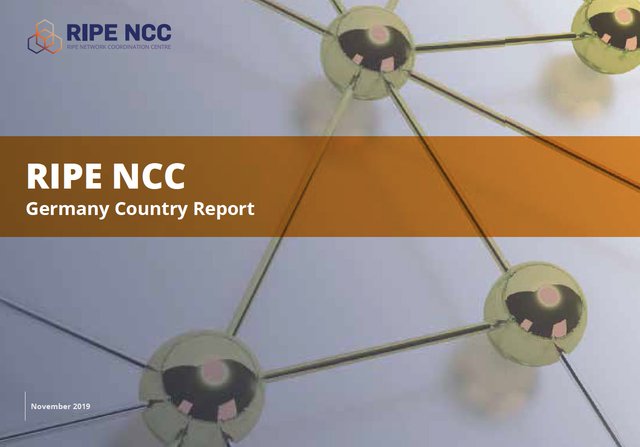
The Germany Country Report includes an analysis of Germany's current market and assesses its potential for future growth, based on current home and mobile broadband use, in the wake of IPv4 run-out. It also examines routing anomalies and the country's access to the global Domain Name System (DNS), as well as its relationship to the global Internet. This analysis is based on what we can observe from the RIPE NCC’s measurement tools as well as a few external data sources.
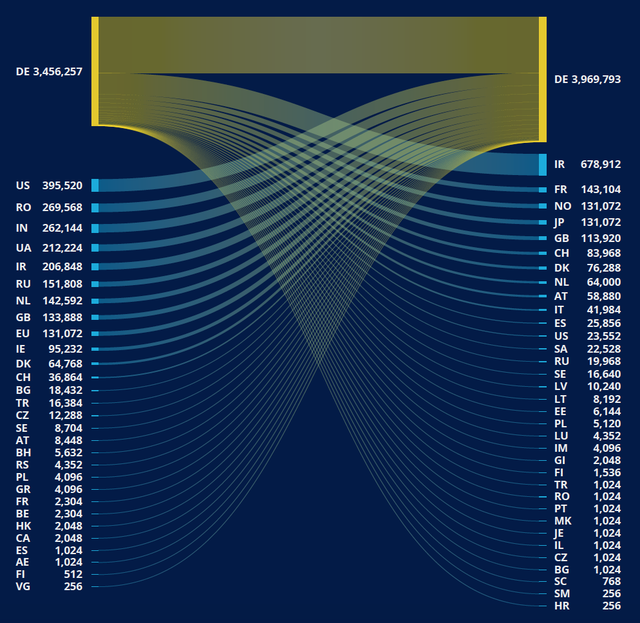
We selected Germany as the third country in our new series ahead of the Internet Governance Forum (IGF), which takes place in Berlin from 25-29 November, in the hopes that the findings will help inform the discussions that will take place there, provide technical insight, and facilitate the exchange of information regarding Internet-related developments in Germany and the different ways in which policy can affect the technical landscape.
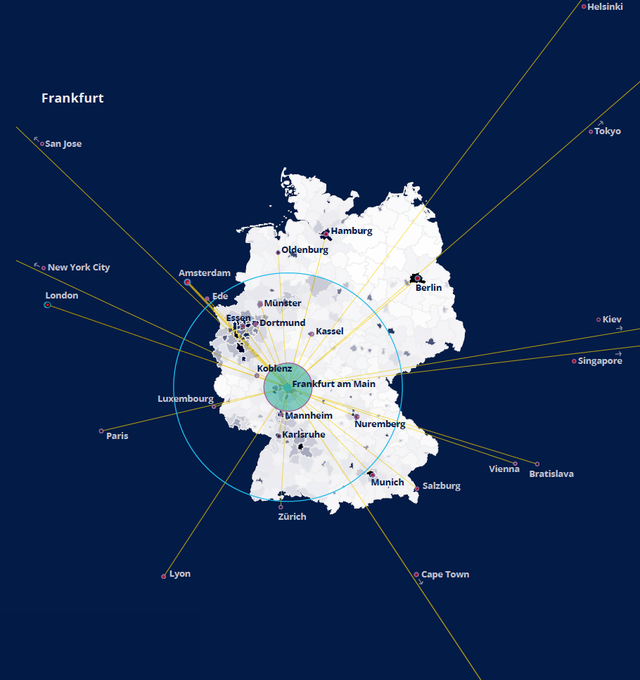
The RIPE NCC previously produced country reports on Saudi Arabia and Russia as part of an ongoing effort to support Internet development throughout our service region by making our data and insights available to local technical communities and decision makers alike.
Data Sources
We want to highlight the fact that these country reports are based on publicly available data. We hope they give you an idea of the kind of information and analysis that's possible using RIPE NCC data. If this report inspires you to learn more about the RIPE NCC tools used to develop it - and perhaps even to pursue your own research into some of these topics - you can learn more here:
Future Reports: What Do You Want?
For our part, we plan to continue producing these kinds of reports, but we would like to hear from you about what data and analysis you find the most interesting and useful. In the future, we may take a more in-depth look at certain topics – such as IPv6, routing or the effect of public policy – or we may focus on a number of countries within a larger region to provide more context and comparison.
Please leave your feedback below and let us know what you'd like to see!

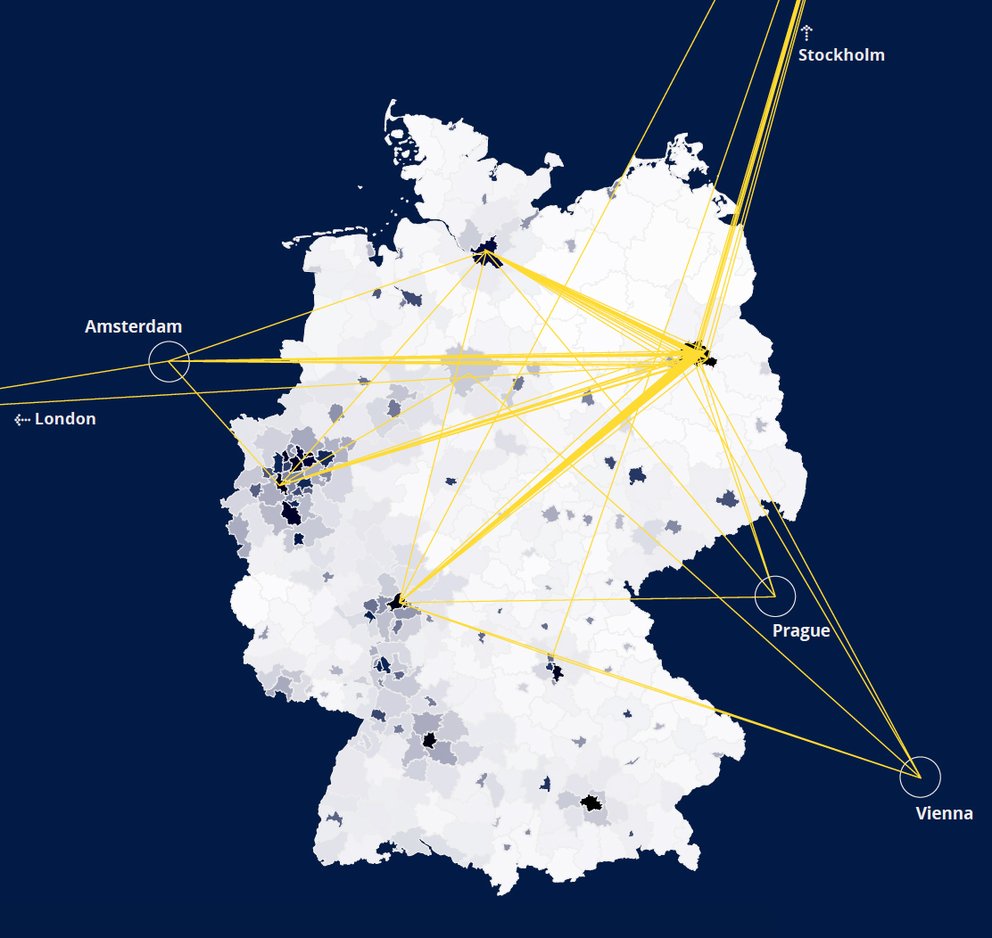
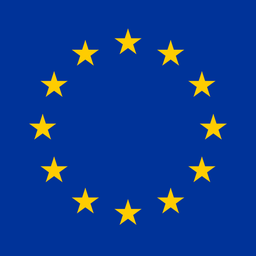
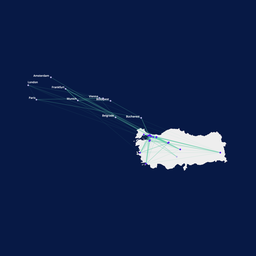

Comments 7
The comments section is closed for articles published more than a year ago. If you'd like to inform us of any issues, please contact us.
Andreas Eggebrecht •
IPv4 addresses transferred within, into and out of Germany Would you mind to comment on the graphic? I assume the left side is supposed to indicate the transfer from a country into Germany, for example US into Germany 396520 However, I´m not sure what the right side implicates? Another 23552 are moved to Germany or from Germany to US? Furthermore, if one side represents a move a country to Germany, and the other side vice versa, what does indicate a move "within"? What puzzles me too is the suffix EU, since Germany is part of the EU, what does this number signify? Where were those servers located before? If you please could help, thanks.
Suzanne Taylor •
Hi Andreas, Thanks for your interest in the report. The left side of the transfers graphic indeed represents the transfer of IPv4 addresses from those countries into Germany, and the right side represents IPv4 addresses that were transferred from Germany to other countries. So even though transfers (totalling 395,520 addresses) were made from the US to Germany, other transfers (totalling 23,552 addresses) were also made from Germany to the US. Transfers within Germany (the thick yellow block at the top of the graphic) represent all the transfers that were made between two different Germany entities. So even though they count as transfers, the addresses remain in the country. The EU designation is indeed a bit confusing. Mapping IP addresses to countries is tricky. For this graphic, we used the public delegation records. This isn’t perfect, as the country codes do not necessarily indicate where a resource is used, but it's the best we have for statistical purposes. For various reasons, some resources are listed as belonging to the EU rather than a specific country - for example, if they belong to a network that operates internationally. I hope that answers your questions, but please let me know if you'd like more information! Best regards, Suzanne Taylor
Dominik •
Great work, thanks! Could you please have a look on Austria and Switzerland next?
Suzanne Taylor •
Thanks for your feedback, Dominik, and we're glad you found the report interesting! We're currently looking into which countries (or topics) we'll focus on next, so stay tuned.
Max •
As a note to IPv6 deployment in your report: You state, you are unaware of IPv6 deployment in mobile networks. Deutsche Telekom has widely enabled IPv6 on their mobile network for most customers, using AS3320 prefix 2a01:598::/29.
Alvaro Gomez-Losada •
Dear Suzanne, Congratulation for this country report. We would like to kindly contact you (or the technical team) for obtaining some information about RIPE databases, and how some of the information in the Germany report could be obtained using your APIs. Could it be possible?
Suzanne Taylor •
Hi Alvaro, thanks! The Germany Country Report was a special project that required a lot of manual digging through our data, so a lot of the data isn't easily accessible via our APIs, but I can put you in touch with the data analysts if you have specific questions. You can get in touch at labs@ripe.net